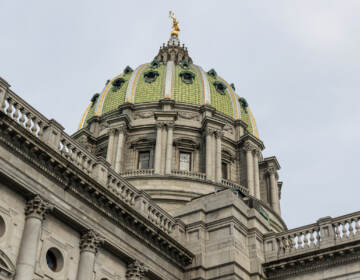Pa. public school advocates meet in Delco, joyous to get their day in court
-

Yeadon Mayor, Rohan Hepkins, thanks those gathered for their hard work in getting a landmark ruling by the Pennsylvania Supreme Court in relation to cases regarding equality in school funding October 25, 2017. (Emily Cohen for WHYY)
-
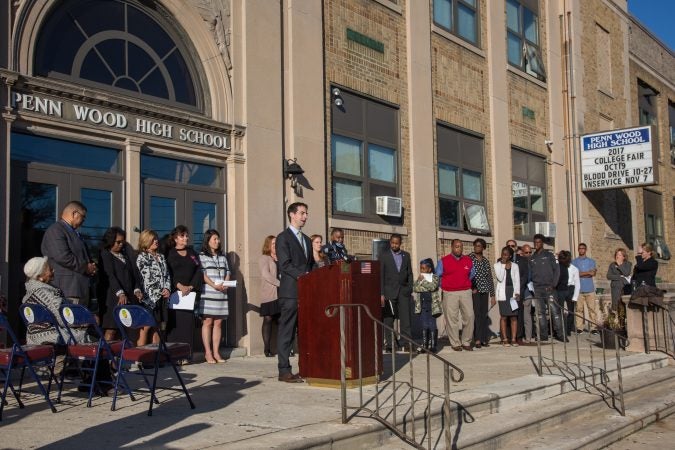
PILCOP attorney, Dan Urevick-Ackelsberg, explains the landmark ruling by the Pennsylvania Supreme Court in relation to cases regarding equality in school funding October 25, 2017. (Emily Cohen for WHYY)
-
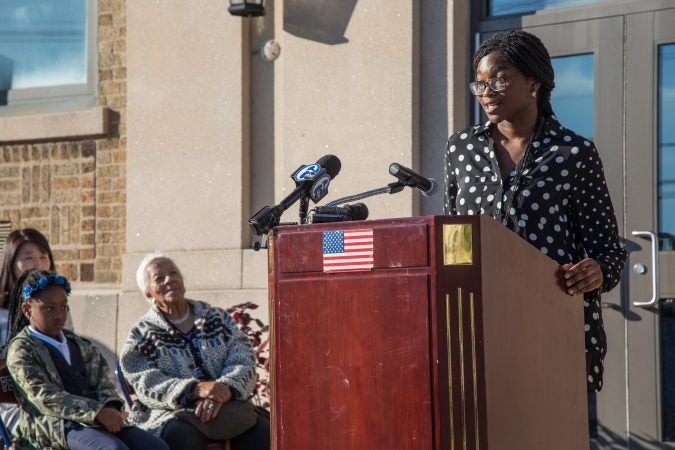
Nia Lartey, Senior class president at Penn Wood High School, reads out a part of landmark ruling by the Pennsylvania Supreme Court in relation to cases regarding equality in school funding October 25, 2017. (Emily Cohen for WHYY)
-
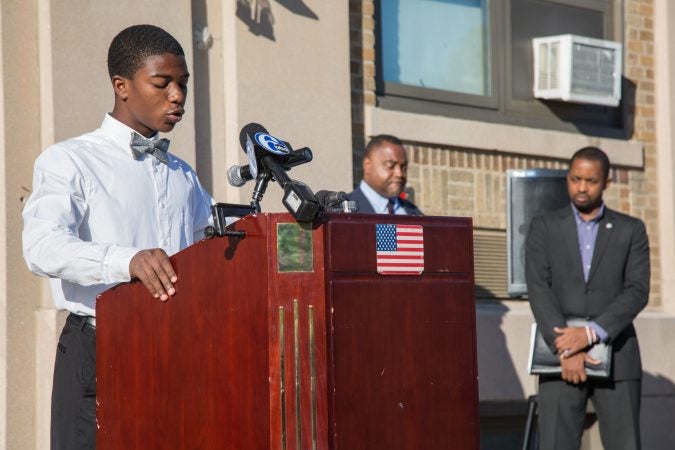
Miles Richardson, Junior class president at Penn Wood High School, reads out a part of landmark ruling by the Pennsylvania Supreme Court in relation to cases regarding equality in school funding October 25, 2017. (Emily Cohen for WHYY)
-
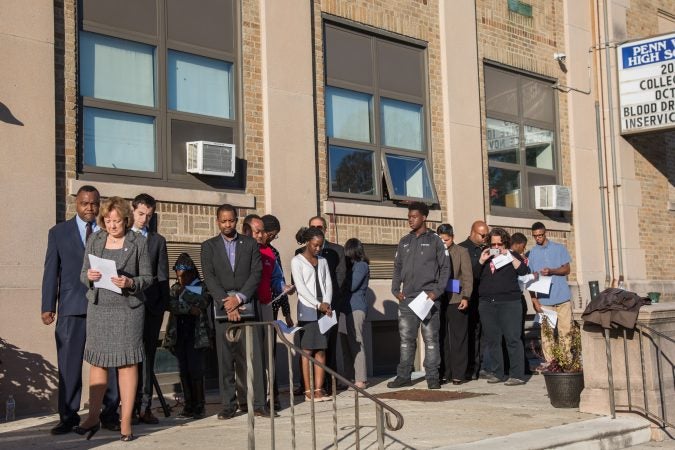
Community members from the William Penn School District in Delaware County gather at an event regarding the lawsuit challenging Pa. school funding. (Emily Cohen for WHYY)
Public education advocates gathered Wednesday in Southeastern Pennsylvania to celebrate a recent state Supreme Court ruling that has cleared the way for a challenge to the state’s system of funding schools.
“I’m excited for our students. I know this is just the first step in this process, and I hope we move quickly on this. We can’t afford to wait,” said Jane Harbert, superintendent of the William Penn School District, one of a group of districts statewide that joined a lawsuit alleging that the state is failing in its constitutional obligation to provide a “thorough and efficient” system of education.
“What we raise on our taxes compared to a Radnor is very different,” Harbert said of her district, which serves a cluster of working class communities just beyond Philadelphia’s western border. “We’re raising $8,000 per child, and they’re raising $12,00 or $15,000.”
The case, William Penn vs. Pennsylvania Department of Education, was first filed in 2014. Last month, the state’s highest court ruled that it could go forward, reversing previous court decisions that found that the issue was not justiciable.
Wednesday, Harbert was joined by students, teachers and attorneys to publicly read from the Supreme Court’s ruling and set the stage for a trial they hope will help make school funding in Pennsylvania more equitible and adequate.
Nia Lartey, the senior class president at Penn Wood High School, recently visited a nearby district that’s worlds apart when it comes to property values, and thus, school funding.
“I just went to Lower Merion High last week, and they have a pool. They don’t have to fight for a threadbare textbook,” said Lartey. “Their students are, I would say, very blessed …. Lower Merion, Upper Darby, even Springfield, their students are better funded than we are. It’s only by their zip code. And that’s not right.”
A trial date for the case has not been set. Attorneys for the plaintiffs expect the case to go to court within a year.
They plan to argue that not only does the state’s overall education budget fall short statewide, but that the money that is spent is distributed “irrationally.”
“We’ll put on the testimony of families, of superintendents, of teachers,” said Attorney Dan Urevick-Ackelsberg of the Public Interest Law Center. “What we’ll show is that children in this commonwealth don’t have the resources they need to meet state assessment standards and become productive members of society.”
Governor Tom Wolf, Education Secretary Pedro Rivera and the leaders of the Republican-held state House and Senate are named as defendants in the lawsuit.
Pennsylvania Department of Education spokeswoman Casey Smith declined to comment on how the state plans to approach the case when it goes before Commonwealth Court.
In the past, the state has argued that questions of exact funding levels are a matter for lawmakers alone, not the courts, and that district-to-district disparities in funding levels reflect Pennsylvanians’ desire for local control.
State attorneys have argued that individual students in Pennsylvania do not have educational rights under the state constitution, and that as long as a “system” of education has been set up, the state has met its obligation.
“The court really rejected that argument. They said that ultimately this is the responsibility of the state,”Urevick-Ackelsberg said.
He thinks the state will now have to “defend this system on the merits, and I don’t know how you do that,” he said. “How do you defend a system where a child can go from having $13,000 spent on him to $26,000 spent on him, depending on what side of the street he’s born on?”
Leaders in the legislature contend that school funding will become more equitable as the state slowly ramps up its use of its new student-weighted funding formula. Many lawmakers have also expressed skepticism that giving more dollars to distressed districts will produce greater academic outcomes.
A stress on homeowners
Among those at Wednesday’s rally was the mayor of Yeadon, Rohan Hepkins, who’s hoping not only for better educational outcomes for students, but relief for residents who’ve seen their taxes go up as the state’s share of overall spending has dwindled.
Forty years ago, the state covered half the district’s expenses; that figure has fallen to about 37 percent. And that shortfall has been covered by residents’ property taxes, which Hepkins said has been particularly tough in his blue-collar, inner-ring suburb.
“Philadelphia can make up the shortfall by taxing cigarettes, sodas, things like that,” Hepkins said. “We don’t have that ability by law – we can only raise property taxes, school taxes. We’ve been doing that year after year, and it makes it unattractive to people to move in – it’s a downward spiral.”
Even a modest rowhome in Yeadon can end up owing $6,000 a year or more in tax, he said. And even with that, the William Penn district struggles to give students what they need, he said.
“What you get in Radnor, Havertown, the richer parts of the county, is lower class size. Here you have 35 [students per class], there they might have fifteen or twenty,” Hepkins said. Prosperous districts get “better curriculum, better computers, better amenities, more technology. And better success in college,” he said.
Harbert said she’ll be glad if the case relieves the burden on local taxpayers. “I’m a resident of this district, and I pay those taxes also,” she said. “And it’s difficult.”
But what she really hopes is to raise the bar for her students and give them what they need to find success after graduation: more individual attention, more academic options, up-to-date amenities like “maker spaces” and technology classes, and fully-funded extracurriculars.
“When our students run for track, they run in our hallways, because we don’t have a track,” she said. “I’m going to say to the court that they’re all students of the state. They are not just a William Penn student. If we really want to improve our communities and our state and our economics, we have to look at our schools – because that’s where it starts.”
WHYY is your source for fact-based, in-depth journalism and information. As a nonprofit organization, we rely on financial support from readers like you. Please give today.



